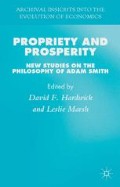Abstract
Was Adam Smith a Scottish philosopher? The question seems an odd one. He was a philosopher and he was Scottish. What more could we need to know, in order to arrive at the simple answer ‘yes?’ And in any case, why does it matter? On reflection, however, neither the question nor the answer seems so simple, and both are more consequential than might be thought at first. Consider the case of David Hume. Hume was Scottish, and Hume was a philosopher, but at one time he was regularly excluded from the canon of ‘Scottish philosophy.’ The reason is not hard to find. For a century or more Scottish philosophy was especially identified with Thomas Reid, the founding figure of the Scottish School of Common Sense, a school that arose from sustained opposition to Hume. In The Scottish Philosophy of Common Sense Selwyn Grave writes:
The philosophy of Common Sense became ‘the Scottish philosophy’ and schooled several generations of Scotsmen ... Its history in Scotland began at Aberdeen with Thomas Reid’s teaching at King’s College and his papers to the Aberdeen Philosophical Society.... The society, important both for the origin and expansion of the philosophy of Common Sense, was formed in 1758 and during its early years gravitated in a distant orbit round Hume ... Reid’s Inquiry into the Human Mind on the Principles of Common Sense, based on his papers to the Aberdeen Philosophical Society was published in 1764 ... The philosophy of Common Sense arose as an ‘answer’ to Hume. (Grave, 1961, pp. 1–4)
I am grateful to Sam Fleischacker for helpful comments on an earlier version of this chapter.
Access this chapter
Tax calculation will be finalised at checkout
Purchases are for personal use only
Preview
Unable to display preview. Download preview PDF.
Bibliography
Bryson, G. (1945). Man and Society, The Scottish Inquiry of the Eighteenth Century (Princeton: Princeton University Press).
Ferguson, A. (1995 [1767]). A Essay on the History of Civil Society, ed. Fania Oz-Salzberger (Cambridge: Cambridge University Press).
Ferguson, A. (2007) Selected Philosophical Writings, ed. Eugene Heath (Exeter: Imprint Academic).
Ferrier, J. F. (2011). Selected Philosophical Writings, ed. Jennifer Keefe (Exeter: Imprint Academic).
Fleischacker, S. (2004). On Adam Smith’s Wealth of Nations (Princeton, NJ: Princeton University Press).
Graham, G. (2014). ‘Hamilton, Scottish Common Sense, and the Philosophy of the Conditioned’, Oxford Handbook of 19th Century British Philosophy, ed. W. J. Mander, pp. 135–53 (Oxford: Oxford University Press).
Grave, S. A. (1961). The Scottish Philosophy of Common Sense (Oxford: Oxford University Press).
Hume, D. (2007 [1739–40]). A Treatise of Human Nature, David Fate Norton and Mary J. Norton (eds) (Oxford: Oxford University Press).
Hume, D. (1998 [1751]). An Enquiry concerning the Principles of Morals, ed. Tom L. Beauchamp (Oxford: Oxford University Press).
Laurie, H. (1902). Scottish Philosophy in its National Development (Glasgow: Maclehose).
Mackintosh, J. (1837). Dissertation on the Progress of Ethical Philosophy, 2nd edition (Edinburgh: Black & Co).
McCosh, J. (1875). The Scottish Philosophy (London: Macmillan & Co).
Oakeshott, M. (1962). Rationalism in Politics and Other Essays (London: Methuen).
Phillipson, N. (2010). Adam Smith, an enlightened life (Harmondsworth: Penguin Books).
Reid, T. (1977 [1764]). An Inquiry into the Human Mind on the Principles of Common Sense, ed. Derek R. Brookes (Edinburgh: Edinburgh University Press).
Robinson, D. S. (1961). The Story of Scottish Philosophy (New York: Exposition Press).
Smith, A. (1976 [1790]). The Theory of Moral Sentiments, D. D. Raphael and A. L. Macfie (eds) (Oxford: Oxford University Press).
Smith, A. (1976 [1776]). An Inquiry into the Nature and Causes of the Wealth of Nations, R. H. Campbell and A. S. Skinner (eds) (Oxford: Oxford University Press).
Seth, J. (1898). ‘Scottish Moral Philosophy’, Philosophical Review 7: 561–82.
Stewart, D. (1858). Collected Works Volume X, ed. Sir William Hamilton, (Edinburgh: Thomas Constable & Co).
Author information
Authors and Affiliations
Editor information
Editors and Affiliations
Copyright information
© 2014 Gordon Graham
About this chapter
Cite this chapter
Graham, G. (2014). Adam Smith as a Scottish Philosopher. In: Hardwick, D.F., Marsh, L. (eds) Propriety and Prosperity. Archival Insights into the Evolution of Economics. Palgrave Macmillan, London. https://doi.org/10.1057/9781137321053_2
Download citation
DOI: https://doi.org/10.1057/9781137321053_2
Publisher Name: Palgrave Macmillan, London
Print ISBN: 978-1-349-45778-6
Online ISBN: 978-1-137-32105-3
eBook Packages: Palgrave Economics & Finance CollectionEconomics and Finance (R0)

